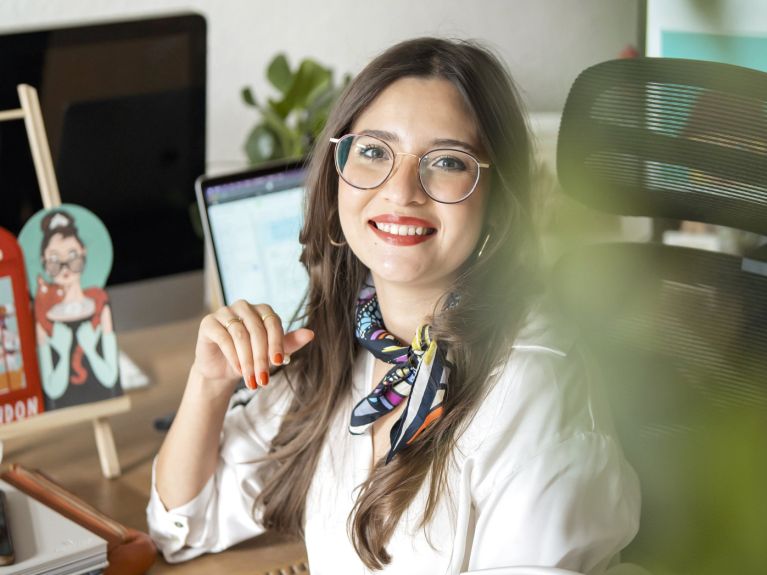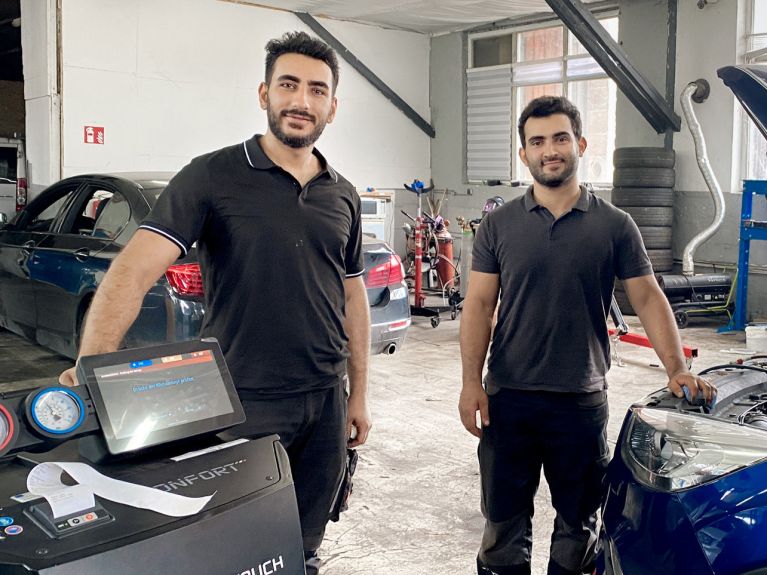Ana and Imad hit the ground running
The media designer from Mexico and the mechanic from Syria who have set out on their own. What does being self-employed mean to them? They share their experiences and tips.

Ana Paniagua gives free rein to her creativity. In her office in Frankfurt she draws sketches, tries things out on her computer, develops ideas – and tosses them into the rubbish bin. Then the perfect idea comes to her. She grins and throws herself back into her work. Around 300 km to the south in Hechingen in Baden-Wurttemberg, Imad Srywel is bent over the engine bay of a vehicle, deep in concentration. His movements are precise, then he checks everything one last time and wipes his oily hands on a cloth, a look of satisfaction on his face. Paniagua is a media designer, Srywel a master vehicle mechatronics engineer. It’s hard to imagine two more different careers, but these two young people share something in common: both are migrants and both have ventured into the world of self-employment.
“Mexicans are feistier – and happier, too, perhaps, but the Germans are more reliable. I like that a lot,” is how Ana Paniagua describes the cultural differences. The 33-year-old comes from Mexico City and studied graphic design in her homeland. It was love that brought her to Germany, where she first worked in Frankfurt as an au pair and took a language course to get to C1 level.
More than anything I always wanted to bring my own ideas to life.
It would have been complicated to get her Mexican degree officially recognised in Germany, so she decided to take a three-year training course in media design at a small advertising agency in Wiesbaden.
Advice and start-up funding
“The training was excellent and my team were lovely, but more than anything I always wanted to bring my own ideas to life. And the best way to do that was by going freelance,” Ana explains. She attended preparation courses, got advice from the Employment Agency, wrote a business plan and at last won start-up funding. Since 2023, she has been creating designs and websites for small and medium-sized companies. Online sales of her range of illustrations, jewellery designs and printed bags are growing, too.
School leaver – trainee – master

Imad Srywel’s journey to Germany was a hard one, as the young Syrian fled the terror of the Assad regime in 2014, passing through Libya and Italy before reaching Bavaria. He learned German and gained a school-leaving certificate in the town of Fürth. After this he trained as a vehicle mechatronics engineer in his new home, the small town of Scheinfeld in Middle Franconia. “I am still grateful to the manager of the car dealership as she always stuck by me, even when I was having problems at the vocational school,” the 28-year-old recalls.
We take our own decisions, that feels good.
After he completed his training, the economy was brought to a standstill by COVID and many businesses cut their employees’ hours, so Srywel kept his head above water by working various jobs. The young mechanic is ambitious. “I wanted to develop myself, so I really gave it everything and passed the Meister exam in 2021,” he says. He even gained German citizenship, too. For two years, Imad had a job at a garage, but he wasn’t happy. “The conditions were bad: low pay and lots of unpaid overtime. So I decided to become my own boss.”
A long to-do list
In October 2023, he teamed up with his electrician cousin and another partner to open a garage in Hechingen. But even before they opened the doors, the trio knew that success wouldn’t come easy. Finding the right property, sourcing capital, meeting the bank manager, signing the rental contract, arranging insurance, registering as a business, investing in equipment: the to-do list was long and hasn’t got any shorter. “It’s pretty demanding, and there’s a lot of paperwork to deal with,” says the young entrepreneur with a shrug.
“You have to pay high taxes in Germany, too,” he adds with a smile. Nevertheless, Srywel is positive about how things are going so far. “We are responsible for what happens and we take our own decisions. That feels good. And most important of all, we’ve got happy customers!”
New arrivals driving startup success
Despite all the challenges, it is clear that the career opportunities for skilled workers from abroad are excellent. Demographic changes mean that many businesses are looking for qualified staff. Figures for new startups show that migrants have long been part of the solution: of the 600,000 people who start their own primary businesses every year in Germany, one in five comes from a migrant background. And that figure is rising.
There is no guarantee of success, but courage and entrepreneurship are often rewarded. In Frankfurt, Ana Paniagua clicks “Publish”, and the new website she has designed goes live. In Hechingen, the lifting ramp sinks down with a whir, and the car which Imad Srywel has repaired rolls off the yard.
The route to a successful startup
Anyone who wants to build a successful startup in Germany needs to prepare well: especially if you come from a migrant background. Migrants from non-EU countries usually require a residence permit for freelance or self-employed work, under section 21 of the Residence Act (Aufenthaltsgesetz). If the founder of the business earns enough from their self-employed work to cover their living expenses, the residence permit will generally be extended for three years in the first instance. After five years, the next step is a settlement permit (Niederlassungserlaubnis), which allows permanent residence in Germany.
The skilled crafts and trades are also governed by the rules of the professional bodies that regulate the industry. In most crafts, you either need to hold the title of Meister to start your own business or you need to employ someone with that title as the Technical Director. That said, certain crafts do not require a Meister title to start your own business. Local Handwerkskammers provide advice on all aspects of the process, such as applying, company registration, employment protection and training. In many cases, these bodies offer dedicated sessions for migrant entrepreneurs for help with topics such as gaining qualifications or getting official recognition for foreign qualifications.
You’ll find the advice you need.
You can find information about visas for freelance and self-employed work at Make it in Germany.
If you are looking for seed capital, there are many sources of advice, funding programmes and affordable loans, such as the Kreditanstalt für Wiederaufbau (KfW) bank.
If you have previously been unemployed, a startup grant from the Federal Employment Agency can help you get started.
Your local Handwerkskammer is a vital source of information.


